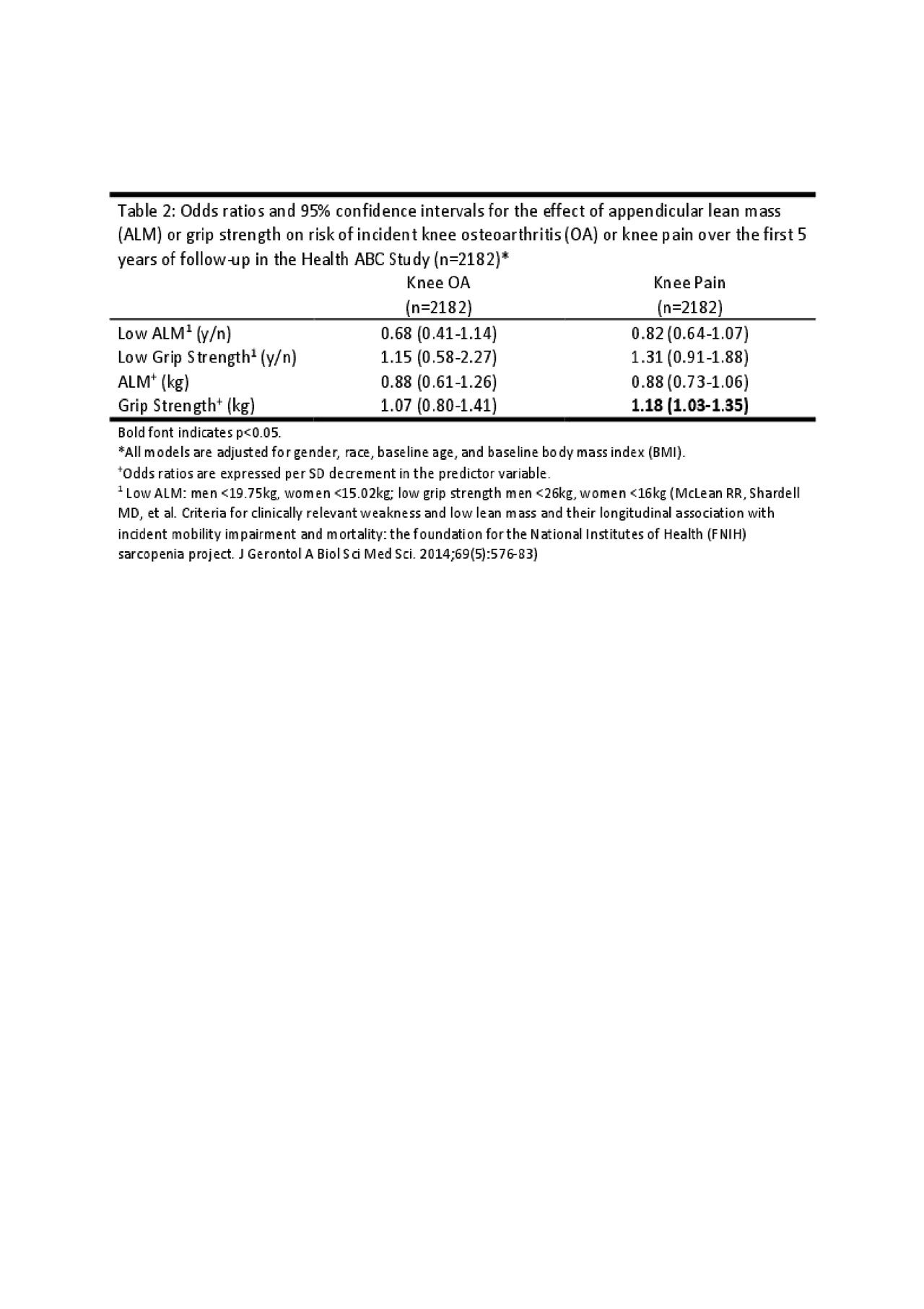Session Information
Session Type: Poster Session (Tuesday)
Session Time: 9:00AM-11:00AM
Background/Purpose: Osteoarthritis (OA) disproportionately affects older adults. Sarcopenia, or reduced muscle mass and strength, is strongly associated with reduced physical function and poor clinical outcomes among older adults. Prior studies of knee OA and sarcopenia used varied measures of muscle mass and strength, and results are conflicting. We tested whether two components of sarcopenia, lean mass and muscle strength, are associated with increased risk of incident knee OA and knee pain among older adults.
Methods: Data derived from the first 6 annual assessments of the Health ABC Study, a study of body composition and physical function in community dwelling adults aged 70-79 years. At baseline, appendicular lean mass (ALM) was measured by whole-body dual energy x-ray absorptiometry and grip strength by hand-held dynamometry. Incident OA by year 5 of follow-up was defined by participants’ report A) that a doctor told them that they have osteoarthritis or degenerative arthritis of the knee, AND B) of having knee pain most days of the last month OR lasting >1 month in the past 12 months. Separate logistic regression analyses modeled the relationship of low ALM (low vs not low) (men < 19.75kg, women < 15.02kg1); and low grip strength (low vs not low) (men < 26kg, women < 16kg1) with the development of 1) incident knee OA and 2) incident knee pain (defined per B) above) over follow-up, adjusting for gender, race, baseline age, and baseline BMI. Participants who were lost or died prior to the end of follow-up were considered as not having developed the outcome, and those with the outcome at baseline were excluded. Secondary analyses modeled relationships of ALM and grip strength as continuous measures with the odds (per standard deviation (SD) decrement in exposure variable) of incident knee OA and knee pain.
Results: Table 1 presents baseline characteristics (n=2182). Forty-one (3.7%) and 300 (26.9%) men, and 94 (4.3%) and 367 (16.8%) women developed incident knee OA and knee pain, respectively. Neither low ALM (compared to not low ALM) nor low grip strength (compared to not low grip strength) was significantly associated with incident knee OA or incident knee pain. However, each SD decrement in grip strength was statistically significantly associated with increased likelihood of knee pain (OR per SD: 1.18, 95%CI: 1.03-1.35), Table 2); but the association between grip strength (as a continuous variable) and knee OA did not reach significance. ALM (as a continuous variable) was not significantly associated with either knee OA or knee pain.
Conclusion: Our findings suggest that weaker grip strength may be associated with development of incident knee pain, but not incident knee OA, in older adults. That those with low grip strength (compared to those without low grip strength) were not statistically more likely to develop incident knee pain suggests that published grip strength cut-points may be inadequate to identify older adults at increased risk of developing knee pain. Those with low ALM (compared to those without low ALM) were not statistically more likely to develop either incident knee OA or knee pain. Grip strength may, thus, be a useful tool to identify older adults at increased risk of knee pain.

Sarcopenia OA Abstract 190528_Table1

Sarcopenia OA Abstract 190528_Table2
To cite this abstract in AMA style:
Andrews J, Gold L, Nevitt M, Heagerty P, Cawthon P. Sarcopenia and the Likelihood of Incident Knee Osteoarthritis and Knee Pain Among Older Adults in the Health ABC Study [abstract]. Arthritis Rheumatol. 2019; 71 (suppl 10). https://acrabstracts.org/abstract/sarcopenia-and-the-likelihood-of-incident-knee-osteoarthritis-and-knee-pain-among-older-adults-in-the-health-abc-study/. Accessed .« Back to 2019 ACR/ARP Annual Meeting
ACR Meeting Abstracts - https://acrabstracts.org/abstract/sarcopenia-and-the-likelihood-of-incident-knee-osteoarthritis-and-knee-pain-among-older-adults-in-the-health-abc-study/
